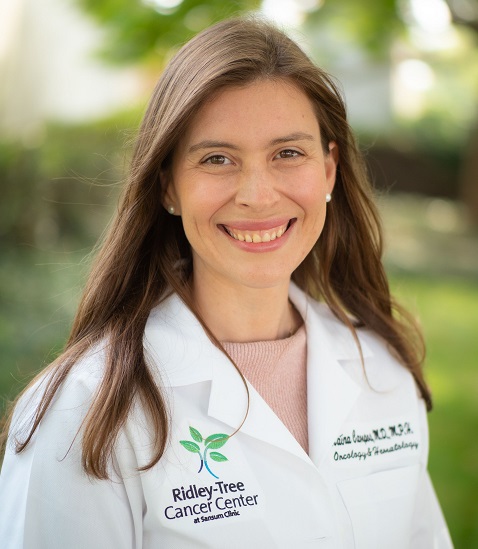Oncologists are physicians who specialize in diagnosing
and treating cancer. These specialists stay up to date
about new research and findings so they can help
people navigate treatment options, showing compassion and
care to their patients and patients’ families. Ridley-Tree Cancer
Center’s Maíra Campos, MD, MPH treats patients with all
types of cancer, with a special interest in breast, ovarian and
endometrial cancers.
Before completing her fellowship in hematology/oncology at
the David Geffen School of Medicine at UCLA, Dr.

Campos completed medical school in Brazil, where she was born and
raised. “I was the first person from my family to have access
to that kind of education,” she says. “I am grateful to have
been given opportunities, including to engage in clinical trials
during my second year of medical school. We were running
our own clinical trials under the mentorship of Dr. Auro del
Giglio and his team. The results of our trials were published
in international journals while we were still medical students.
That helped us see that we can have an impact in the world
with the resources that we are given.”
In her fourth year of medical school, Campos was invited to
present one of her papers at the American Society of Clinical
Oncology (ASCO) annual meeting in Chicago. ASCO is a professional organization representing physicians of all
oncology subspecialties who care for people with cancer. Her
experience presenting at ASCO motivated her to uproot from
her native homeland. At age 24, she sold her car and moved
to the United States to complete an observership at Jackson
Memorial Hospital in Miami. She held a research position for a
year and a half at the University of Miami.
During her residency at University of Miami, Campos
volunteered her time and medical expertise to help victims of
the 2010 earthquake in Haiti. “We provided care for as many as
fifty patients per day in ten-hour shifts,” she shares. “The UN
was delivering food by helicopter. It was the most humbling
experience I’ve ever had in my life.”
Her volunteer work in Haiti was a continuation of a personal
practice of charity and compassion. For ten years, from high
school to the end of medical school, she volunteered to help
people in poor local communities. “I would call companies and
ask them to donate medications that were desperately needed
by people living in the shantytowns of São Paulo,” she says. “We
distributed medicine, did cancer screenings and gave free talks
in the community to educate people about cancer prevention. It
was my first experience working with patients, and it revealed to
me that you become family with patients as an oncologist.”
Dr. Campos joins Ridley-Tree Cancer Center with a passion
for women’s health. She intends to leverage her expertise in
breast cancer research to expand clinical trials and capabilities
in Santa Barbara County. She also believes patients referred
to Ridley-Tree oncologists benefit from a team approach from
the very beginning of their care. “Patients meet their surgeon,
oncologist and radiation specialist at the outset of treatment
and get an overview of the plan for their care and treatment,”
she explains. “Working as a multidisciplinary team from the
beginning of a patient’s case, we are able to provide better
communication and better care.” Weekly conferences are
held where all cases are discussed among the specialists.
They have conversations with patients about treatment
options and therapies.
The field of oncology has recently benefitted from advances
and innovations that improve diagnostics and treatment of
cancer. One such development is a diagnostic procedure for
early-stage breast cancer called Oncotype DX, which assesses gene expressions of known cancer-related genes to predict
how likely breast cancer is to recur after treatment. “The
Oncotype DX test provides information that can lead to more
personalized treatment,” Dr. Campos explains. “It provides us
with a better understanding of breast cancer so we may provide
less aggressive treatment or therapy for patients who would truly
benefit from it.”
Patients with certain types of cancer may benefit from a new
procedure called immunotherapy, also known as immuno-oncology. Immunotherapy stimulates the immune system to
improve its natural ability to fight cancer. “Moving forward,
treatments such as immunotherapy enable us to provide cancer
treatments that are more personalized for each tumor type and
its characteristics instead of a one-size-fits-all approach such as
chemotherapy,” Dr. Campos explains.
Walking the Path With Patients
“Advances in medical science enable us to walk the path
with our patients to allow them to enjoy a quality of life and
increased survival rates,” Dr. Campos says. “No matter what
stage of cancer a patient has, when they walk through the door
of our cancer center they can feel that they have a family here
and are part of a team that they can relate to.”
Fluency in Spanish and Portuguese helps Dr. Campos relate
directly with many of her patients for whom English is not
their native language. “Oncology often involves difficult and
complex discussions that are hard to accomplish through a
translator,” she says. “Cultural nuance can be lost. My ability
to communicate with Hispanic and Latino patients in their
native language helps them feel loved and cared for. They are
treated with dignity here. All people deserve the best cancer
care no matter their circumstances or financial resources. From
the primary care doctors working hard on prevention, to our
specialty care, I am always very impressed with the high quality
of care and focus on creating a healthier community.”
“It is gratifying to be able to walk this path where we are
addressing the whole person,” Dr. Campos summarizes.
“Cancer patients need time to talk about their life, not rushed
through a fifteen-minute office visit. As a doctor, you can never
lose track of the fact that you have a human being in front of
you. I entered this profession because I love helping people feel
better physically and emotionally. That’s why I love what I do.”